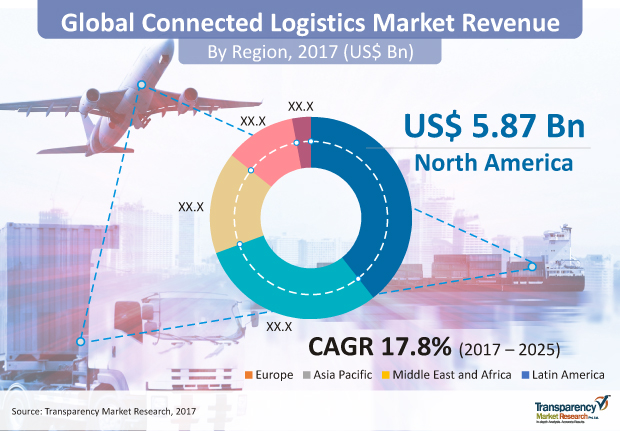
Global Connected Logistics Market: Snapshot
Key players in the global connected logistics market are adopting numerous growth strategies to steal a march over their competitors. Besides product development, key players in the global connected logistics market are resorting to mergers and acquisitions to gain competitive advantage.
Majorly fuelling growth in the global connected logistics market is the breakthrough development in the transportation of sensitive products such as pharmaceuticals. For example, severe temperature fluctuations at the time of transport of pharmaceuticals sends alert to the manufacturer to take action before the products get damaged.
Get Sample Copy:
https://www.transparencymarketresearch.com/sample/sample.php?flag=S&rep_id=25196
The rising prominence of internet of things in the logistics industry, along with multiple applications of connected logistics in e-commerce, the global connected logistics market is receiving a boost.
A report by Transparency Market Research predicts the global connected logistics market to rise at a robust 17.8% CAGR over the forecast period between 2017 and 2025. At this pace, the market will become worth US$55.17 bn by the end of 2025 from US$10.21 bn in 2016.
Asset Management to hold Dominant Market Share
The global connected logistics market by service has been segmented into asset management, remote asset tracking, security, network management, and data management. Amongst all, asset management is likely to account for the leading share in the connected logistics market. At present, globalization and the need for advanced transportation and logistics infrastructure is fuelling the demand for automated logistic systems. This is where the virtues of asset management software come into play in terms of assisting freight and infrastructure managers to address a number of service and performance issues.
In terms of end-use, the key segments into which the global connected logistics market has been divided are freight management, food and beverage supply chain, healthcare, retail. Warehouse management, and others.
Grab an exclusive PDF Brochure of this report:
https://www.transparencymarketresearch.com/sample/sample.php?flag=B&rep_id=25196
Asia Pacific to Clock Robust Growth in Near Future
The global connected logistics market, by geography has been segmented into North America, Asia Pacific, Latin America, the Middle East and Africa, and Europe. North America presently holds supremacy in the global connected logistics market vis-à-vis revenue. This is mainly due to the demand for integrity control from businesses that deal in delicate products.
Europe is positioned second in terms of revenue share in the global connected logistics market. The growth of this market is mainly driven by the rising adoption of connected logistics in the healthcare sector. In general, the healthcare and pharmaceuticals industry face a number of challenges in the supply chain. The transportation of several pharmaceutical products need to meet temperature and pressure specifications from preventing damage to these commodities. The damage to any particular unit could result in huge loss for the product manufacturer. In healthcare and pharmaceuticals, distribution of perishable products, which could be of high value, from one facility to another also needs reliable facility to prevent damage.
Vis-à-vis growth rate Asia Pacific is expected to surpass other key regions over the forecast period. The region is expected to expand at an impressive CAGR of 18.1% between 2017 and 2025. The burgeoning e-commerce sector that needs real-time tracking of products is majorly driving the connected logistics market in Asia Pacific.
Some of the leading players operating in the global connected logistics market include International Business Machines Corporation, Google Inc., Amazon Web Services Inc., SAP SE, Infosys Limited, Microsoft Corporation, Dynatrace LLC, NETSUITE Inc., Feightgat Inc., and Oracle Corporation.
Demand for Seamless Delivery of Goods bestows Growth in Connected Logistics Market
The increasing penetration of Internet of Things in the transportation of sensitive products such as pharmaceuticals is a key factor fuelling growth in the connected logistics market. For example, severe temperature fluctuations during the time of transport of pharmaceutical products sends alert to transportation agency to take action to prevent the damage of products.
The rising prominence of e-commerce, wherein connected logistics plays a critical role is creating immense opportunities for the connected logistics market.
Key segments into which the connected logistics market is divided based on service are remote asset tracking, data management, asset management, and security network management. Asset management is likely to hold the leading share in the connected logistics. The need for advanced transportation and logistics infrastructure fuelling the demand for automated logistic systems narrows down to asset management software for their virtues. Freight assistance and infrastructure management are some virtues of asset management software that enables to address a number of service and performance issues.
North America currently holds supremacy in the connected logistics market. Key factor fuelling the connected logistics market in the region is demand for integrity control from business enterprises that deal in delicate products. However, Asia Pacific is expected to overtake other key regions of the overall connected logistics market in the coming years. The flourishing e-commerce sector that relies on real-time tracking of products for delivery timetable is creating opportunities in the connected logistics market of the region.
The connected logistics market features the presence of some large players in the fray. Process development and incorporation of avant-garde technology are some growth strategies that key players in the connected logistics market are employing to garner larger share. Amazon Web Services Inc., International Business Machines Corporation, Microsoft Corporation, Google Inc., and SAP SE are some large players operating in the connected logistics market.





